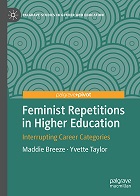Feminist Repetitions in Higher Education

Maddie Breeze and Yvette Taylor discuss their new book and consider why feminist education continues to be so necessary
Why does feminism in education matter now?
Education has long been a site of feminist contestation. From analyses of gender differences in educational outcomes, through restrictive norms re-produced in curricula, to the fight for women and girls to access education, feminist thought and activism are central to understanding and intervening in global educational inequalities.
In Scotland and the rest of the UK, recurrent controversies underscore the continued necessity of feminist education. For instance, contemporary policy and practice shifts in LGBTQ+ school inclusion reanimate legacies of Section 28/2a, and re-expose how heteronormativity characterises everyday educational interactions. Social structures of class, gender, and race persist in shaping trajectories from school leaver to university graduate. Gender-based violence is endemic in educational institutions, alongside wide reports of sexist and racist discrimination even amidst heightened concerns with ‘inclusion’ ‘equality’ and ‘diversity’. As educators, we explore these issues, including in our new MEd module Understanding Gender and Sexuality in Education, and Career Long Professional Learning courses on Creating Feminist Classrooms, LGBTQ+ Inclusive Education, and Widening Participation.
Feminist analyses show how apparently progressive education policy can actually reinforce harmful inequalities, as, for example, when policies on trans inclusion gloss over transphobic backlash or when narratives of ‘progress’ about LGBTQI+ rights block their full realisation. In universities, critical feminist analysis is vital for understanding how the mainstreaming of equality and diversity backfires, co-opting watered-down feminist rhetoric, while marginalising feminist political commitments and feminists themselves.
Can the university (still) be a site of feminism?
This is one of the key questions that we set out to address in Feminist Repetitions in Higher Education: Interrupting Career Categories. Universities are one place where feminism is (un)done. Our research shows that doing feminism in the university requires a laboured repetition: making feminist moves and evidencing feminist arguments, over and over again.
Feminist work may be located on the threshold of academic legitimacy, always at risk of dismissal, rejection, and hostility. But feminist repetitions are also necessary precisely because of how feminist work has been co-opted and incorporated in the university. Some feminist methodologies and pedagogies have been mainstreamed and taken up. At the same time, some feminisms (and feminists) may be left behind – not easily incorporated into celebrations of (middle-class, white) women in leadership for instance.
The book demonstrates how feminists negotiate changing educational contexts, doing feminism and interrupting the non-feminist university. It hopes to contribute new understandings, practices and methods for making and holding space for feminism in contemporary higher education.. Here we present some reflections, provocations – even repetitions – on Feminist Repetitions in Higher Education:
Why do we need a book on feminism in higher education?
Yvette:
The work of feminism in and beyond higher education is not done. We know this in inhabiting the still unequal university, from blocked entry points (who gets into which universities, on what courses, with what resources…), to institutional filters (from promotion to redundancy…), through final successes (graduation, leadership, REF recognition….). So, we still do the work of feminism as gender, and other intersectional inequalities, change and reconfigure in contemporary times. We see girls’ and women’s educational successes as signs of feminist arrival, but we query this in thinking about disciplinary divides, persisting gender pay gaps, and our own dis-locations across, for example, race, sexuality and class. The book isn’t a go-to guide of how to be a feminist in higher education; we interrupt our own arrival, identifications and investments just as we interrupt feminism, stretching its meanings, possibilities, failures and futures.
Who is the book for?
Maddie:
This book is for anyone with an interest in feminism. Feminist readers may recognise their own experiences of inhabiting higher education in the book, and we hope these experiences become collectivised via the book, helping to think about collaborative strategies for interrupting academic hierarchies at the same time as taking up university space. We do this by turning to the academic career as an important site for understanding the everyday possibilities and limits of feminist work in higher education. Each of the book’s chapters considers repetitions in relation to feminist conventions for inhabiting universities: educational mobility in progressing an academic career, queer feminist collaboration across the career course, feminist approaches to leadership in the university, and ways of knowing grounded in lived experiences. We’ve tried to re-think feminist conventions and offer some fresh perspectives on pushing back against institutional failures, useful to anyone who is looking to reflect upon and invigorate their feminist practice.
Why is feminist work in universities so repetitive?
Yvette:
Feminism is often challenged, rendered redundant, biased and so on within and beyond the university. These associations simplify feminism and often negate the wealth and complexity of debates (and frustrations) within feminist thinking across time and place. In that context a repetition – of value and worth – becomes a refusal. But repetitions can be frustrating and exhausting, and speaking about on-going inequalities can render you, the feminist, as ‘old’, stuck, and behind the new times. In universities, there may be repetitions around the need and value, for example, of Gender Studies, or around the need to stretch metric measures that count gender (for example, counting women leaders or inserting men into feminised subjects as gender-balance and success). Gender is produced in and through educational institutions and actors, and we need to both repeat and interrupt this in reimagining gender. As feminist educators, our repetitions may be the first time that students have actually encountered feminism in the classroom.
What do you mean by methodological interruptions?
Maddie:
We wanted to find a way to attend to feminist repetitions, whilst avoiding simply repeating only our own voice(s), saying only the same thing again. Responding to this problem, we drew on and stretched established feminist methods (such as researcher reflexivity, autoethnography and collaborative autobiography) to develop fictionalised accounts. We worked together to interweave our stories, and used creative techniques to interrupt what otherwise may have been singular stories.
Our ‘interruption methods’ began from the observation that accounts of academic careers can be linear, limited and predetermined, particularly in CVs, job applications, yearly performance reviews, and so on. Academic career making is also done in online settings such as Twitter or the proliferating platforms listing and promoting academic publications. What all these forms for storying an academic career have in common is that they foreground achievement and forward motion. While ‘failures’ in academic careers can represent dramatic turning points, sharply felt disappointments and exclusions. We wanted to re-focus on the routine repetitions – and interruptions – that characterise the day to day of work of doing feminism in the university.
We gathered artefacts and thoughts generated in our own negotiations of the career course and our 5-year collaboration. These included iterations of our CVs, documentation from performance reviews, equalities audits, archived email correspondences with each other, notebooks and diaries, application forms, and drafts of funding bids. Using these artefacts as prompts for writing, we shared early drafts with each other, iteratively re-working each other’s recollections and fictionalised elaborations. Our thinking and doing was interrupted, as we took on various positions in relation to each other, ourselves, and the academic career course.
Why did you write a book in the middle of a pandemic?
Yvette:
The pandemic really took hold as we were finalising the book. Books – and research, teaching, and administrative work – all have a history that precedes their publication or delivery. In making this maybe obvious point I mean to point to the work, often across years, that goes into academic production. And to the different endemic crises, including of precarity, pay, and pensions, which may be viewed as ‘business as usual’, as repetitions across time and place. Our own conditions of production are something to be mindful of, and especially to collectivise and politicise these. We ask, in the book’s acknowledgement, if the book itself has been interrupted by the pandemic, and if academic writing is a sufficient response, if readers, imagined as staff and students, have the capacity to – digitally – digest our findings. Writing together has meant, in part, writing through the pandemic, and we still wonder how universities will deliver academic supports and responses, including in the production of future feminist scholarship.
Why did you decide to work together and co-author this book?
Maddie:
One motivation was to return to issues and concerns from our earlier collaborations. We’d written together about feminist collaboration across the career course, and this lead to more ideas bursting beyond the journal article format. Another motivation is perhaps more strategic, writing the book itself is a way to take up feminist space in our university, a way to further evidence feminist presences and again show that feminists are at work in the university. Writing together about feminist collaborations repetitions, and interruptions is also a way to do feminist collaborations, to build shared capacities from differently located positions in the university and to stretch ourselves.
The Strathclyde Feminist Research Network organises a programme of regular seminars with invited guest speakers, free and open to all.
For further discussion on issues of feminist co-productions, creative methods and contemporary feminist debates, see the edited & illustrated collection Feminism in our Times: Crises Connections and Care.
Dr Maddie Breeze and Professor Yvette Taylor both work in the School of Education, University of Strathclyde and together they convene the Gender Research Subtheme which showcases interdisciplinary gender research from across the university.
Published 23/04/2021
Image - Pixabay
